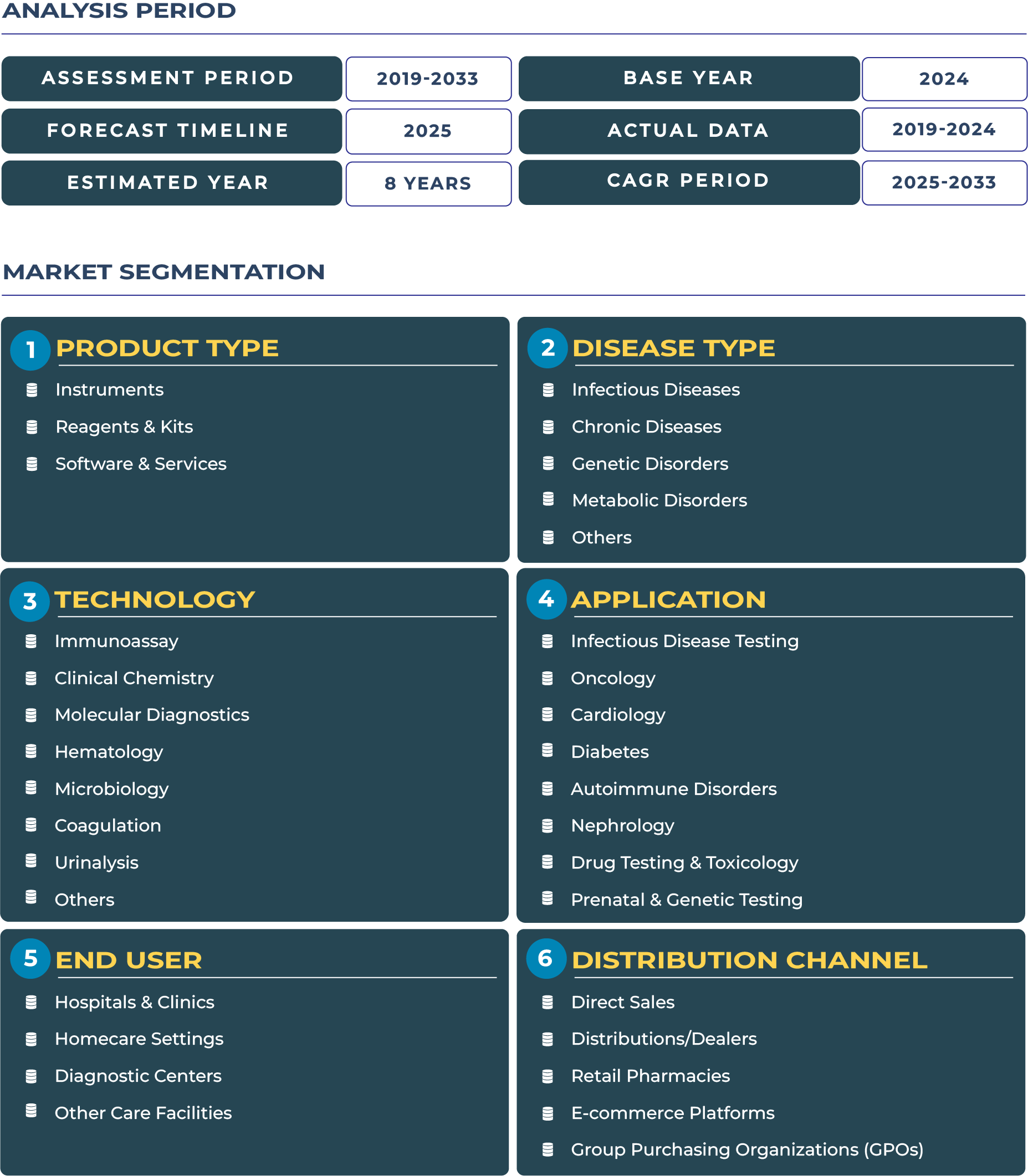Singapore In-vitro Diagnostic Market Outlook: Pioneering Precision Medicine in Asia’s Premium Healthcare Hub
Singapore has cemented its reputation as a premium medtech and diagnostic innovation hub within Asia, leveraging its advanced healthcare ecosystem, strong regulatory framework, and thriving biotechnology sector. Known for its medical excellence and high clinical standards, Singapore’s commitment to precision medicine and clinical research continues to propel the In-vitro Diagnostic (IVD) market. As one of the most digitally connected and innovation-driven economies, Singapore serves as a launchpad for advanced diagnostic systems and software solutions across Asia-Pacific.
Singapore In-vitro Diagnostic Market is forecasted to grow from USD 844.5 million in 2025 to USD 1,911.3 million by 2033, expanding at a robust CAGR of 10.7%. This growth reflects the city-state’s strategic focus on biomedical sciences, precision diagnostics, and translational medicine. Backed by government initiatives under Singapore’s Ministry of Health (MOH) and supported by leading institutions such as A*STAR, Singapore IVD ecosystem benefits from an ideal blend of infrastructure, clinical expertise, and regulatory transparency. High medical tourism inflows and increasing adoption of advanced diagnostic reagents, automated testing instruments, and data-driven pathology software further reinforce the market’s momentum. As a global hub for clinical excellence, Singapore’s diagnostic laboratories and hospitals are embracing innovation to improve turnaround times, accuracy, and patient outcomes, aligning with the country’s Healthier SG vision for preventive healthcare.
Drivers & Restraints: Understanding the Forces Shaping Singapore Diagnostic Landscape
High-ASP Hub and Regulatory Clarity Driving Market Growth
Singapore’s reputation as a high-ASP (Average Selling Price) healthcare destination enhances the profitability of diagnostic solutions. The presence of internationally accredited laboratories and global R&D centers has positioned Singapore as a nucleus for premium diagnostic trials and instrument validation. The city’s clear and efficient regulatory framework, overseen by the Health Sciences Authority (HSA), ensures swift approval pathways and maintains global quality standards. Furthermore, Singapore’s commitment to public-private collaborations in genomic testing, point-of-care diagnostics, and digital pathology is encouraging sustained innovation. As healthcare systems across ASEAN look to Singapore for best practices, the country continues to lead in implementing precision-based IVD technologies across clinical and research domains.
Small Domestic Volumes and Market Entry Costs Limiting Broader Expansion
Despite its sophistication, the Singapore IVD market faces challenges tied to its limited domestic population and relatively small test volume. While high-end technologies dominate, the smaller testing base limits scalability for mass-market diagnostics. Additionally, high operational and compliance costs, coupled with the competitive presence of regional medtech hubs like Malaysia and South Korea, can deter smaller players. Companies must adopt adaptive pricing models and leverage cross-border partnerships to sustain profitability. Nonetheless, Singapore remains a preferred testing ground for premium instruments and reagents that later scale across broader ASEAN markets, reaffirming its role as an innovation lighthouse rather than a volume-driven market.
Trends & Opportunities: Transforming Diagnostics Through Technology and Collaboration
Clinical Trials and AI-Driven Diagnostics Reshaping the Future
One of the defining trends in the Singapore IVD industry is the rise in clinical trials and AI-powered diagnostic systems. With the government’s focus on genomics and translational medicine, collaborations between hospitals, universities, and biotech firms are accelerating breakthroughs in molecular and infectious disease diagnostics. Singapore’s National University Health System (NUHS) and research networks are pioneering digital diagnostic trials integrating machine learning for faster, more precise analyses. The expansion of reagent-based molecular tests, coupled with advanced software analytics for predictive diagnostics, is reshaping the city’s healthcare outcomes. As healthcare digitalization intensifies, laboratories are integrating data platforms to optimize workflow efficiency and enhance clinical decision-making.
Global Collaborations and Export Opportunities Strengthening Market Potential
Singapore IVD industry is leveraging its global reputation to attract strategic collaborations with leading diagnostic firms. Partnerships focused on clinical validation, product localization, and technology co-development have become key opportunities. The country’s ability to host pan-ASEAN pilot trials and export diagnostic services further bolsters its economic impact. Singapore’s designation as a regional headquarters for multinational corporations allows them to coordinate regulatory, R&D, and clinical trial operations for the entire Southeast Asian region. Additionally, the growing emphasis on sustainable diagnostics and reagent manufacturing presents opportunities for environmentally responsible product lines, supporting the broader green healthcare transition.
Competitive Landscape: A Strong Nexus of Global Giants and Local Innovators
Singapore In-vitro Diagnostic landscape is characterized by the presence of major international players such as Roche Diagnostics, Abbott, Siemens Healthineers, and bioMérieux, alongside homegrown innovators like Veredus Laboratories and MiRXES. Roche has established Singapore as one of its regional hubs for clinical research and diagnostic innovations, while MiRXES continues to expand its RNA-based diagnostic solutions, partnering with regional hospitals for cancer detection trials (2024). Moreover, the Health Sciences Authority’s support for digital health sandboxes has enabled IVD firms to pilot AI-assisted diagnostics safely and efficiently. Companies increasingly utilize Singapore as a regional R&D showcase, hosting advanced workshops and symposiums that attract healthcare professionals from across Asia-Pacific. This collaborative environment ensures the continuous evolution of diagnostic standards and reinforces Singapore’s position as a thought leader in precision diagnostics.







